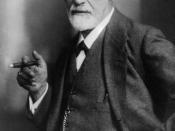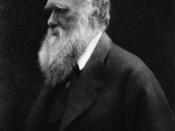In the mid 16th Century scientists and thinkers such as Bacon, Descartes, Copernicus and Newton began to, through their discoveries; challenge the Christian perspective of the world. The earth was displaced as center of the universe and the natural laws governing it like gravity were proven to be mathematical not moral. These discoveries challenged the traditional Christian explanation of creation as well as the moral, social and political world orders the church had created. In this enlightened environment of science and reason thinkers began to look for alternative scientific explanations for phenomena that Christian cosmology could no longer explain. Evolutionary Theory was one idea that arose in the nineteenth century to try and explain the emergence of biology and society. These theories were adopted by scientists and thinkers such as Charles Darwin, Hebert Spencer, Edward Burnett Tylor, Lewis Henry Morgan, Karl Marx and Friedrich Engles, and Sigmund Freud. While all these great men specialized in different areas, came to different conclusions, and influenced the academic, economic, social and political worlds in different ways a similar rational and scientific evolutionary perspective can be seen in all their work.
It is the similarities and differences of Evolutionist that this essay is going to focus on.
Evolutionary theory was employed by these men to try and explain why and how biological and social entitles evolved as they did. It is traced back to Charles Darwin who is often given the credit for the ideas that emerged in his era. Darwin published huge collections scientific data in his "Origin of Species" he used this to argue that over millions of years creatures were continually coming into being and becoming extinct. In "Descent of Man" Darwin went as far as to argue that all biological entities, including humans, have evolved over time due to...



Very interesting
A very interesting and well presented history of evolutionism. References were outstanding. A few minor punctuation errors, but not enough to detract from the paper.
Outstanding.
10 out of 10 people found this comment useful.